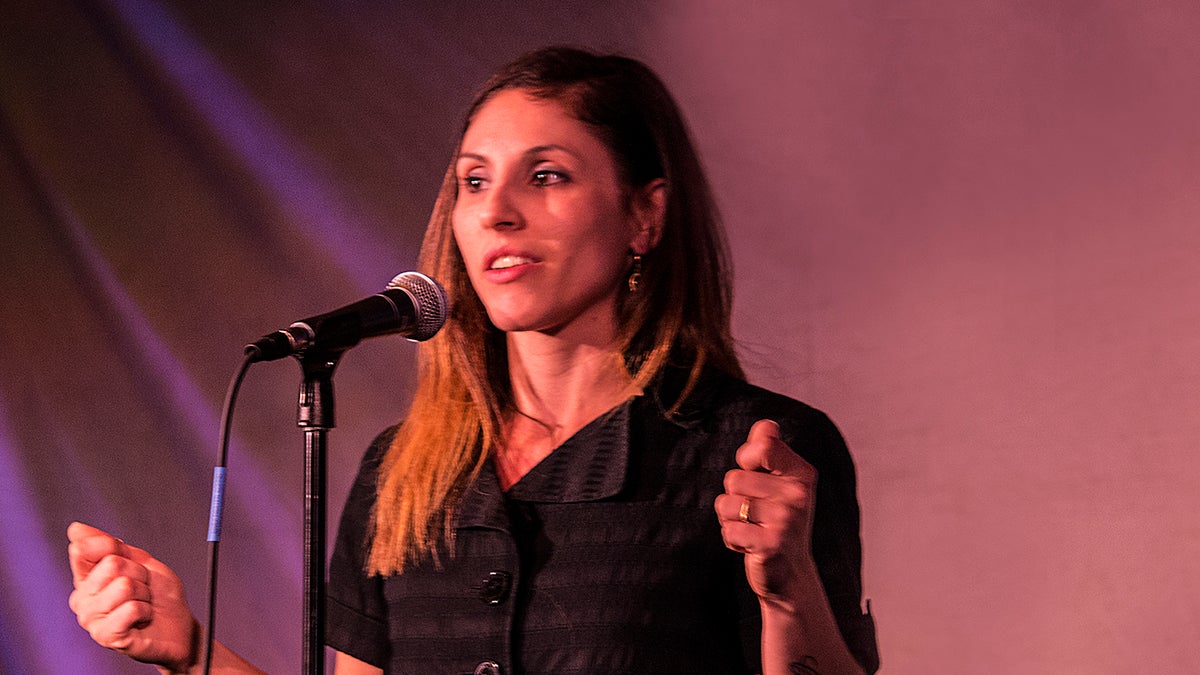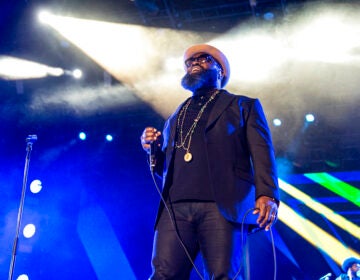Playing Google’s nontraditional recruitment game
Listen
Justine Parks Cuny (Image courtesy of Jamie Shaw)
NewsWorks presents a story from the First Person Arts podcast. Justine Parks Cuny describes her trip to Seattle during a manic episode for a disastrous yet illuminating job interview with Google.
As part of a monthly series of stories from the First Person Arts podcast, NewsWorks presents this story from Justine Parks Cuny. In the throes of a bipolar manic episode, she once traveled to Seattle for a job interview with Google — determined to ace the corporation’s highly nontraditional applicant evaluations.
The result turned out to be a watershed moment for her.
Stories are chosen from FPA story slams, where storytellers are challenged to deliver a true five-minute tale about their lives, based on a theme, in front of a live audience, and without notes. This story was originally performed live as part of story slam in April. The theme of the night was “lost in translation.”
Listen to the story above. A transcription follows. [Audio production by Kimberly Haas.]
I was living in Austin, Texas, at the time. I was working for a mutual fund company. And I had a lot of free time. So I started developing this social network — designing it, working on it in my free time. I decided after about six weeks of working on it that I would go pitch this idea to Google Ventures.
So I flew out to Seattle, and they had a Google Ventures company right across the street from this really awesome coffee shop. It wasn’t like Starbucks. It was like Seattle awesomeness perfect hipster coffee shop. And I decided to finish working on my presentation there.
By the way, sidebar: I brought my whole family out. I had my husband and my 9-month-old son at the time. I was like — I’m working on my presentation. Just hang out. Go to the zoo.
I was just typing away, and I knew that I was across the street from this company. Did you know that Google had these really nontraditional recruiting techniques. Like for example, they had these billboards that they would put on the side of the road that just had an equation on it, this massive math equation. Normally people just drive right by it. But the only people it would pique their interest would be these computer geeks or math nerds or whatever that would just look up and be like: Hmm, I feel like solving that equation. And they would solve it, and they would go tho this website and enter the answer. And it would take them to another website where they would go to another equation that they would have to solve. And it would take them to another website with another equation they would have to solve. And then eventually it would take them to another website that said, “Welcome to Google. You’re hired.”
That’s what they do. So I knew this about them. So anyway, I’m sitting in the coffee shop across the street from Google Ventures, and all of a sudden I’m typing away on my presentation, and it starts like moving around on my page. And I was just like: “I get it. They can kind of, like, see what’s going on on my computer right now.”
And I get a little nervous. I kinda felt like I had to pee. And so got up and went to the rest room. And I came back and I realized that my zip drive was missing.
I’m like: OK. Game on.
I slapped my laptop closed. I ran across the street, banged on the door, and was like: “Someone stole my zip drive. I need to get my presentation. I’m ready to go now.”
And the tiny little Japanese woman in the kimono who opened the door was like: “Hey, this is a doctor’s office.”
And I was like: I can’t believe that they hired actors! This is crazy!
So I shoved her out of the way and walked to the back of the room. I’m looking around. There’s all these people and these patients. I’m just like: Whoa, this is crazy. And I get to the back and I’m looking for the board room, because I want to give my presentation, and I get to the back and there’s just this tiny little office with a woman standing there on the phone … talking to the police.
She was saying, you know, “there’s somebody trespassing here…” And I’m like: Oh, this is getting cool.
And then the cop walked in, and he was super cute, and I totally had recognized him from SNL. I knew he was an actor, too. And he had this glint in his eye as he was coming to cuff me. And he grabbed me, and as he was walking me out, I was flirting with him. Because I knew this guy. I knew I had seen him somewhere but couldn’t remember the actor. It was something with Justin Timberlake. I’d seen it before.
So then he tried to take my computer. I had my laptop with me and I was holding on for dear life. I knew this was part of Google — to protect your intellectual property, and i was like: I am not going to fail this test. And so I held on to it as he tried to pull the laptop away from me. I actually slammed myself down on the ground. And he tried to pull it away again, and so I bit him. And I knew, I was like: Man, I probably scored some massive points for that one.
They took me to the police station. I’m standing there. And my husband arrived with my son, and he’s standing there as well. And I was like: Wow, I can’t believe they have him in on this too! Did they tell him while he was at the zoo, or did they call him when I was in Austin? I just could’t figure it out.
But then they took me to the hospital to get evaluated because I knew that they do that with all high-level executives — just a psychological evaluation prior to the — it’s part of the interview, it’s standard.
And I think I did really well. They released me within a day and they were like “… massive manic episode” — something like that. And I was released, and I went back to Austin, and two and a half years passed, and I’m kinda still waiting for that second interview.
We connected with Justine this week to learn more about what it means to her to have bipolar disorder. Some years removed from the events in her story, Justine says, “I believe that telling stories about bipolarity, or about mental illness in general, is the best way to alter negative perceptions and reduce the stigmas.”
Here’s a brief Q&A:
1. Had you been diagnosed as bipolar prior to the events in Seattle, or was that your first experience with a situation like that?
No. That was when I first received my bipolar diagnosis. In hindsight, I had had manic episodes prior to Google, but that was my first psychotic break with reality.
2. I think the most amazing thing is that you have the courage to tell this story at all — let alone in front of an audience, let alone laugh at it. How did you acquire the capacity to look at the humor of the situation amidst a very real danger?
I’ll start backwards: Personally, I prefer not to call it “bipolar disorder,” unless I’m discussing bipolarity in a medical/therapeutic context. I typically just say “I’m bipolar” because, for better or for worse, it’s an integral part of my identity. Getting my diagnosis simply put a label on a collection of things I already knew about myself to be true. I don’t wish to be “normal.” In fact, I don’t know what it’s like to be “normal” any more than a “normal” person is able to conceptualize what it’s like to be bipolar.
Regarding my ability to tell the story and laugh about it: Bipolar people are generally perceived to be unpredictable, erratic and dangerous. Generally, bipolar people are reluctant to come “out” because of these negative perceptions. As you heard in my story, we are certainly capable of that type of behavior. However, bipolar does not look the same for everyone, and we don’t all manage our bipolarity in the same way.
It’s scary to come out about being bipolar. Many bipolar folks don’t wish to be characterized by their bipolarity and they’re concerned that friends, family and employers may perceive them as different or incapable. Bipolar people are different but not incapable. We’re natural creatives, and our passionate, divergent thought processes can be channeled into a variety of personal, professional or artistic contexts.
3. Were you able to present to Google in the end?
No, and I’m glad for that! My idea was only partially developed and was borne out of delusional grandiosity. I know nothing about computer science. I’m embarrassed to think of it now but, at the time, I thought I had invented the next Facebook.
4. The First Person Arts podcast host introduced you as a ‘talent and organizational development professional.’ What does that mean?
I develop and launch initiatives designed to enhance employee performance, retention, engagement and culture. It is a strategic HR function that includes talent identification, new employee on-boarding, team dynamics, organizational development, management and leadership training and career tracks.
5. How would you compare Philadelphia and Austin?
Austin is a small, eclectic, hipster city. I used to call it “the land of summer vacation,” because the weather was always hot and sunny and everyone was really laid back and casual. I also loved the food culture in Austin; I miss that more than most things.
Philadelphia is a larger, faster-paced, more diverse city. It is harder to summarize what Philadelphia is, in a nutshell, because it is so big and there is still so much left for me to explore.
—
Justine Parks Cuny is a talent and organizational development professional. She likes to write short, experimental plays, practice circus aerials, run and climb, shop at vintage and antique stores and sip fancy beer.
To find out more about story slams, visit www.firstpersonarts.org.
WHYY is your source for fact-based, in-depth journalism and information. As a nonprofit organization, we rely on financial support from readers like you. Please give today.




